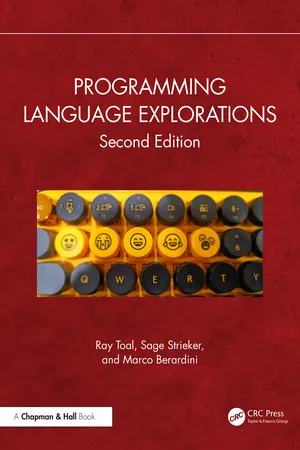
- 408 pages
- English
- ePUB (mobile friendly)
- Available on iOS & Android
Programming Language Explorations
About this book
Programming Language Explorations helps its readers gain proficiency in programming language practice and theory by presenting both example-focused, chapter-length explorations of fourteen important programming languages and detailed discussions of the major concepts transcending multiple languages. A language-by-language approach is sandwiched between an introductory chapter that motivates and lays out the major concepts of the field and a final chapter that brings together all that was learned in the middle chapters into a coherent and organized view of the field.
Each of the featured languages in the middle chapters is introduced with a common trio of example programs and followed by a tour of its basic language features and coverage of interesting aspects from its type system, functional forms, scoping rules, concurrency patterns, and metaprogramming facilities. These chapters are followed by a brief tour of over 40 additional languages designed to enhance the reader's appreciation of the breadth of the programming language landscape and to motivate further study.
Targeted to both professionals and advanced college undergraduates looking to expand the range of languages and programming patterns they can apply in their work and studies, the book pays attention to modern programming practices, keeps a focus on cutting-edge programming patterns, and provides many runnable examples, all of which are available in the book's companion GitHub repository. The combination of conceptual overviews with exploratory example-focused coverage of individual programming languages provides its readers with the foundation for more effectively authoring programs, prompting AI programming assistants, and, perhaps most importantly, learning—and creating—new languages.
Tools to learn more effectively

Saving Books

Keyword Search

Annotating Text

Listen to it instead
Information
Table of contents
- Cover Page
- Half-Title Page
- Title Page
- Copyright Page
- Dedication Page
- Contents
- Preface
- Chapter 1 ■ Welcome
- Chapter 2 ■ Lua
- Chapter 3 ■ JavaScript
- Chapter 4 ■ TypeScript
- Chapter 5 ■ Python
- Chapter 6 ■ Ruby
- Chapter 7 ■ Java
- Chapter 8 ■ Kotlin
- Chapter 9 ■ Julia
- Chapter 10 ■ Clojure
- Chapter 11 ■ Haskell
- Chapter 12 ■ Go
- Chapter 13 ■ C
- Chapter 14 ■ Swift
- Chapter 15 ■ Rust
- Chapter 16 ■ Additional Languages
- Chapter 17 ■ Concepts
- Glossary
- Bibliography
- Index
Frequently asked questions
- Essential is ideal for learners and professionals who enjoy exploring a wide range of subjects. Access the Essential Library with 800,000+ trusted titles and best-sellers across business, personal growth, and the humanities. Includes unlimited reading time and Standard Read Aloud voice.
- Complete: Perfect for advanced learners and researchers needing full, unrestricted access. Unlock 1.4M+ books across hundreds of subjects, including academic and specialized titles. The Complete Plan also includes advanced features like Premium Read Aloud and Research Assistant.
Please note we cannot support devices running on iOS 13 and Android 7 or earlier. Learn more about using the app